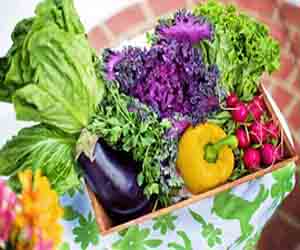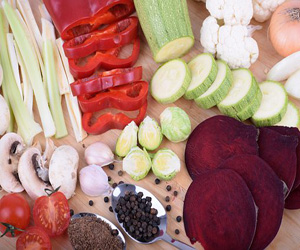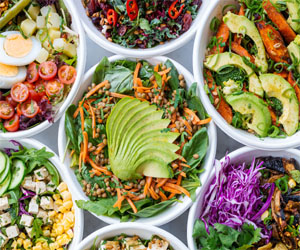


Nourishing Your Body And Soul

In today's fast-paced world, where processed and convenience foods often take center stage, there's a growing need for a return to wholesome cooking. Wholesome cooking goes beyond just preparing meals; it's an approach to food that embraces fresh, natural ingredients and a mindful culinary process. This practice not only enhances the flavors of your dishes but also nurtures your well-being, creating a more holistic and satisfying relationship with food.
What Is Wholesome Cooking?Wholesome cooking revolves around the idea of preparing meals from scratch, using unprocessed, nutrient-dense ingredients. It's about creating dishes that prioritize health, flavor, and the joy of eating. This approach avoids artificial additives, preservatives, and unhealthy fats often found in processed foods.
The Benefits Of Wholesome Cooking:
Wholesome cooking offers a wide array of benefits for your health, well-being, and lifestyle:
1. Nutrient-Rich Meals: Wholesome cooking allows you to maximize the nutritional value of your meals. By using fresh fruits, vegetables, whole grains, lean proteins, and healthy fats, you ensure that your body receives the essential vitamins, minerals, and antioxidants it needs.
2. Flavorful Dishes: One of the highlights of wholesome cooking is the exceptional flavor of the dishes you prepare. Using fresh and natural ingredients results in meals bursting with taste, aromas, and textures that can't be replicated by processed foods.
3. Control Over Ingredients: Wholesome cooking gives you complete control over what goes into your food. You can avoid excessive salt, sugar, and unhealthy fats, ensuring that your meals align with your dietary preferences and health goals.
4. Mindful Eating: Preparing meals from scratch encourages a mindful approach to eating. You become more attuned to the flavors and textures of your food, fostering a deeper appreciation for each bite and promoting better portion control.
5. Versatility: Wholesome cooking is incredibly versatile. It accommodates various dietary preferences, whether you're a vegetarian, vegan, paleo, or have specific food allergies. You can adapt recipes to suit your unique needs.
6. Creativity And Satisfaction: Wholesome cooking encourages culinary creativity. Experimenting with fresh ingredients and trying new recipes can be an enjoyable and fulfilling experience that satisfies your creative side.
How To Embrace Wholesome Cooking:
If you're looking to adopt a more wholesome cooking approach, here are some practical steps:
1. Plan Your Meals: Planning your meals in advance helps you choose wholesome recipes and shop for fresh ingredients. It also saves time and minimizes food waste.
2. Stock Your Kitchen: Keep your kitchen stocked with a variety of whole foods, including whole grains, fresh produce, lean proteins, and healthy fats.
3. Experiment With Fresh Ingredients: Try to incorporate seasonal and locally sourced ingredients into your dishes. Experimenting with new flavors and ingredients can be an exciting culinary adventure.
4. Learn Cooking Techniques: Invest time in learning basic cooking techniques, like sautéing, roasting, and steaming. These skills will empower you to create a wide range of dishes.
5. Make Cooking A Social Activity: Invite friends or family to cook together. Sharing the cooking experience can be a delightful way to bond and enjoy wholesome meals.
Wholesome cooking is more than just preparing food; it's a way of nurturing your body and soul. By embracing fresh, natural ingredients and mindful culinary practices, you can enjoy the health benefits, flavor, and satisfaction that come with wholesome meals. Wholesome cooking allows you to take control of your diet, prioritize your well-being, and savor the culinary pleasures of life.
Nourishing The Body And Soul
 The Appeal Of Hearty Meals
The Appeal Of Hearty Meals
There are several reasons why hearty meals remain so popular and beloved:
1. Comfort In A Dish: Hearty meals offer the kind of comfort that can only come from food made with love and care. They're reminiscent of family gatherings, holiday feasts, and cherished traditions.
2. Sustenance: Beyond the emotional connection, hearty meals provide the sustenance our bodies crave. They often include a balanced combination of protein, fiber, and carbohydrates, making them satisfying and energizing.
3. Versatility: Hearty meals come in various forms, from stews and casseroles to roasts and pastas. This versatility means there's a hearty meal for every palate and occasion.
4. Timelessness: The appeal of hearty meals is timeless. They've been cherished for generations, and their flavors and textures continue to stand the test of time.
5. Celebratory Nature: Hearty meals often take center stage at celebratory gatherings. Think of Thanksgiving dinners, Sunday roasts, or holiday potlucks. These occasions revolve around the joy of sharing a hearty meal with loved ones.




Nourishing Your Body And Mind
 Nutrient Density
Nutrient Density
Whole foods are rich in nutrients, making them an essential part of a healthy diet. They provide an abundance of vitamins, minerals, and antioxidants that nourish the body, strengthen the immune system, and reduce the risk of chronic diseases. Because they are dense in nutrients, they help you meet your daily nutritional requirements with fewer calories, which can support weight management and overall health.
Dietary Fiber
Whole foods, particularly fruits, vegetables, and whole grains, are excellent sources of dietary fiber. Fiber is crucial for digestive health, as it promotes regular bowel movements, prevents constipation, and supports a healthy gut microbiome. Additionally, fiber helps regulate blood sugar levels, reducing the risk of diabetes, and promotes a feeling of fullness, aiding in weight control.
Natural Energy Sources
Whole foods provide a steady source of energy. They release their nutrients more slowly into the bloodstream, preventing the rapid spikes and crashes in blood sugar associated with processed foods. This steadier energy flow helps maintain alertness, focus, and sustained physical and mental endurance throughout the day.
Transforming Your Life For The Better
 Lifestyle change is a concept that holds the potential to redefine our well-being, relationships, and overall quality of life. It involves a deliberate and conscious shift in one's habits, behaviors, and choices, often with the aim of improving health, happiness, and fulfillment. Whether you're seeking to overcome challenges, enhance your personal development, or simply find a better path in life, lifestyle change is a powerful tool to help you accomplish these goals.
Lifestyle change is a concept that holds the potential to redefine our well-being, relationships, and overall quality of life. It involves a deliberate and conscious shift in one's habits, behaviors, and choices, often with the aim of improving health, happiness, and fulfillment. Whether you're seeking to overcome challenges, enhance your personal development, or simply find a better path in life, lifestyle change is a powerful tool to help you accomplish these goals.
The Catalyst For Change
Lifestyle change often begins with a catalyst, a moment of realization that prompts you to reevaluate your current situation. It could be a health scare, a feeling of stagnation, or a desire for greater self-fulfillment. Whatever the trigger, it serves as a powerful motivation to embark on a journey of transformation.
Setting Clear Goals
The first step in making a lifestyle change is setting clear and realistic goals. Whether your focus is on health, career, relationships, or personal growth, defining what you want to achieve is essential. These goals provide a sense of direction and purpose, making it easier to stay on course during the change process.
A Journey Through The World Of Fine Brews
 4. Exploration Of Coffee Cultures: Coffee connoisseurs often delve into the coffee cultures of different regions. They explore the traditions and rituals associated with coffee, from the espresso bars of Italy to the coffee ceremonies in Ethiopia.
4. Exploration Of Coffee Cultures: Coffee connoisseurs often delve into the coffee cultures of different regions. They explore the traditions and rituals associated with coffee, from the espresso bars of Italy to the coffee ceremonies in Ethiopia.
5. Sensory Development: Developing a keen palate and an acute sense of smell is paramount. Connoisseurs practice sensory exercises to identify the flavors, aromas, and even the body of coffee. They participate in cupping sessions, where they evaluate the qualities of different beans and roasts.
A Recipe For Health And Convenience
 Meal planning is a culinary skill that has grown in importance over the years, offering numerous benefits for individuals and families. It involves preparing a strategy for what to eat, how to shop, and how to prepare your meals in advance. This proactive approach to food management not only makes life easier but also has profound implications for health, nutrition, and overall well-being.
Meal planning is a culinary skill that has grown in importance over the years, offering numerous benefits for individuals and families. It involves preparing a strategy for what to eat, how to shop, and how to prepare your meals in advance. This proactive approach to food management not only makes life easier but also has profound implications for health, nutrition, and overall well-being.
The Basics Of Meal Planning
Meal planning is a systematic approach to deciding what to eat and when. It typically involves:
Menu Creation: You select the dishes and recipes you'd like to prepare for a set period, whether it's for a week, two weeks, or a month.
Ingredient List: Once your menu is set, you compile a list of all the ingredients you'll need for those meals.
A Key To Health And Enjoyment
 Preventing Dietary Deficiencies: A monotonous diet that lacks variety can lead to nutritional deficiencies. For instance, relying solely on a narrow selection of foods may result in inadequate intake of specific nutrients like vitamin C, calcium, or fiber. Over time, such deficiencies can contribute to health problems. By diversifying your diet, you reduce the risk of missing out on these critical nutrients.
Preventing Dietary Deficiencies: A monotonous diet that lacks variety can lead to nutritional deficiencies. For instance, relying solely on a narrow selection of foods may result in inadequate intake of specific nutrients like vitamin C, calcium, or fiber. Over time, such deficiencies can contribute to health problems. By diversifying your diet, you reduce the risk of missing out on these critical nutrients.
Enhancing Taste And Satisfaction: Food variety doesn't just benefit your health; it also elevates your culinary experience. A diet rich in diverse flavors and textures can make every meal a delightful adventure. Savoring different foods stimulates your taste buds and keeps meals exciting and enjoyable. It can prevent food boredom and discourage overindulgence in less nutritious, but more familiar, options.
Cultural Exploration: Exploring a variety of foods exposes you to different culinary traditions and cultural practices. This exploration can be a delicious way to learn about diverse cultures, fostering a deeper appreciation for the richness and diversity of the world. It also encourages an understanding of the importance of cultural food heritage.
Diverse Nutritional Profiles: Different foods have different nutritional profiles. For instance, leafy greens provide a wealth of vitamins and minerals, while whole grains offer fiber and sustained energy. Lean proteins like fish and poultry are rich in essential amino acids. By incorporating all of these into your diet, you ensure a holistic approach to nutrition that supports all aspects of health.
Nourishing Your Mind, Body, And Soul
 The Wholesome Pantry is a brand that has wholeheartedly embraced the philosophy of wholesome living. Their mission is to provide individuals with access to products that not only taste delicious but also support a healthier lifestyle. They understand that nourishing your body begins with the food you consume but doesn't end there.
The Wholesome Pantry is a brand that has wholeheartedly embraced the philosophy of wholesome living. Their mission is to provide individuals with access to products that not only taste delicious but also support a healthier lifestyle. They understand that nourishing your body begins with the food you consume but doesn't end there.
Eating For Wholesome Living: At the core of wholesome living is the food we consume. Choosing natural, unprocessed, and nutrient-rich foods is essential. Wholesome living emphasizes fresh produce, locally sourced ingredients, and sustainable agricultural practices. The Wholesome Pantry exemplifies this by offering a range of products that are not only delicious but also made from clean, quality ingredients. By selecting foods without additives, preservatives, and artificial flavors, you're supporting your health and well-being.